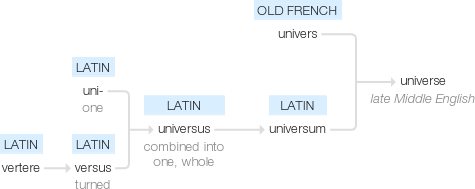Universe
late Middle English: from Old French univers or Latin universum, neuter of universus ‘combined into one, whole’, from uni- ‘one’ + versus ‘turned’ (past participle of vertere ).
wiktionary
From Middle English universe, from Old French univers, from Latin universum(“all things, as a whole, the universe”), neuter of universus(“all together, whole, entire, collective, general, literally turned or combined into one”), from uni-, combining form of unus(“one”) + versus(“turned”), perfect passive participle of vertō(“to turn”).
etymonline
universe (n.)
1580s, "the whole world, cosmos, the totality of existing things," from Old French univers (12c.), from Latin universum "all things, everybody, all people, the whole world," noun use of neuter of adjective universus "all together, all in one, whole, entire, relating to all," literally "turned into one," from unus "one" (from PIE root *oi-no- "one, unique") + versus, past participle of vertere "to turn, turn back, be turned; convert, transform, translate; be changed" (from PIE root *wer- (2) "to turn, bend").
